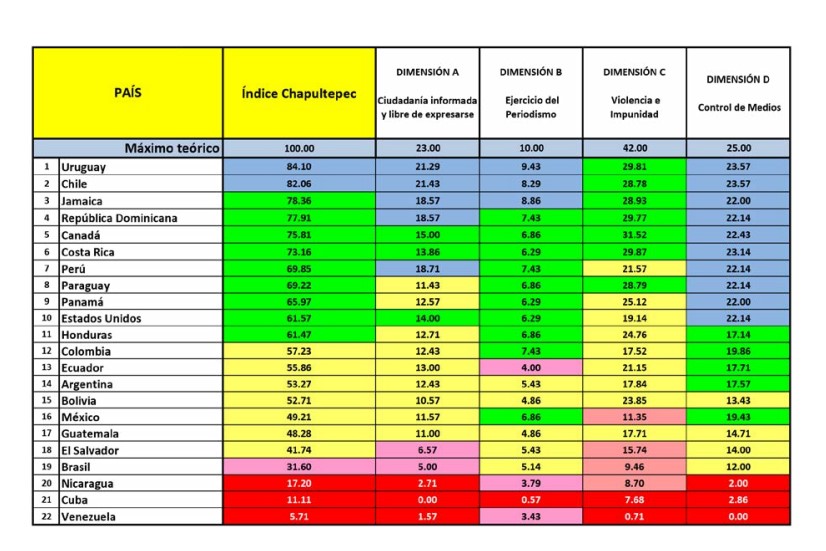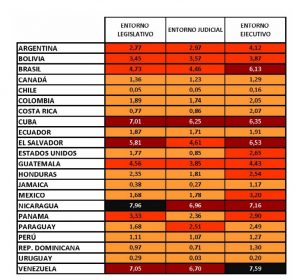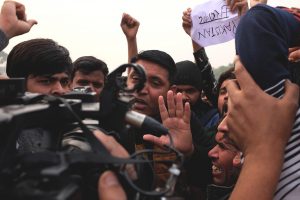The scenario for journalists, media professionals and society worsened in Brazil in 2021, according to the Inter-American Press Association’s (SIP) Chapultepec Freedom of Expression and Press Index, presented this week by the Miami-based organization.
In a list of 22 countries, Brazil ranks 19th after only Nicaragua, Cuba and Venezuela. And although the ranking was unchanged compared to the 2020 analysis, the country lost 5.6 points last year to only 31.60 out of 100.
The organization, which says, “The authoritarian rhetoric of the Executive Power not only affects the press with constant attacks and crimes, but also disrupts the already fragile democracy in the country,” underlines the organization by stating that it is the Power that has the greatest influence on Brazilian journalism.
Brazil ‘restricts’ freedom of expression with executive intervention
The Chapultepec Index assesses four criteria to measure the state of freedom of expression in America: informed citizenship; journalistic exercise; media control; and violence and impunity.
The organization says the report also helps SIP develop public interest and leadership projects that create added value and social impact.
“The Index’s annual results point to areas where we need to promote public policy reforms in our quest to strengthen freedom of the press and expression, as well as being a reference for journalistic information.”
In the data collected between 31 July 2020 and 1 August 2021, Uruguay scored the highest (84.10 points). Chile (82.06) and Jamaica (78.36) close the top three places in the table.
At the bottom of the list was Brazil: 19. The country was ahead of Nicaragua (17.20), Cuba (11.11) and Venezuela (5.71), the worst country in the Americas in terms of freedom of expression and press.

In its analysis of Brazil, the IAPA concluded that the role of journalism was “very limited” in the country. The Index highlights the role played by the Executive in “controlling the flow of disinformation and information promoted by organized groups” that aggravates this scenario.
“In response, media cohesion in defense of democratic principles and freedom of expression has been strengthened,” the report says.
The worst performances in Brazil were in the Informed Citizenship and Freedom of Expression and Violence and Impunity assessments.
The organization underlines that the process of degradation of freedom of expression and press is not “fully new” in the country. However, despite its history, it intensified with the election of President Jair Bolsonaro from 2018:
“Journalists and the media have been described, with rare exceptions, as enemies to be faced by the Chief Executive and his allies.
Attacks on journalists and media companies began to recur, as did a selective policy of distributing advertising resources and blatant monitoring of public communication channels as if they were government property.”
Read more
Brazil was ranked 110th in the 2022 Press Freedom Index, which marks the ‘new era of polarization’.
In this already unfavorable environment for press work, the IAPA adds that the covid-19 pandemic has become “another bulwark” in Brazil:
“On the one hand, health authorities, the media, the Federal Supreme Court (STF), a significant portion of the National Congress, and state governors; On the other hand, the federal government. ”
Despite the challenges imposed over the past four years and the government’s hostile stance, the report assesses that the Brazilian press has fulfilled its role in combating disinformation and providing public interest services during the health crisis. And warning:
“In the context of a crisis intensified by the Covid-19 pandemic, the deterioration of guarantees of freedom of expression has deepened.”
Not just in Brazil: Administrators block free speech almost all over America
The Chapultepec Index’s world average of 55.61 (out of 100) shows a slight improvement in the perception that freedom of expression and press is partially restricted, with a difference of 4.19 points from the results of the previous edition (51.42). region.
However, there is an important fact that can undermine this visible improvement: In 15 of the 22 countries examined in the Americas, the executive branch appears to be the most effective environment in situations unfavorable to freedom of expression.
And in three of the five worst-rated countries, the legislative environment appears to be the second most effective in situations unfavorable to freedom of expression and press freedom: El Salvador, Brazil and Venezuela.

Nicaragua and Cuba have greater influence, “reflecting the strengthening of a legal framework that legally restricts the exercise of freedom of expression and the press,” according to the report.
In five countries, the judiciary appears to be the second most influential power (Argentina, Bolivia, Chile – with which it shares influence with the legislature –, Costa Rica and Mexico). In Paraguay this is the most effective Power.
Uruguay, the country best rated in the index, has the Judiciary as the country with the least influence in cases against freedom of expression and press freedom. The full report can be accessed at this address. connection.
read it too
source: Noticias
[author_name]
